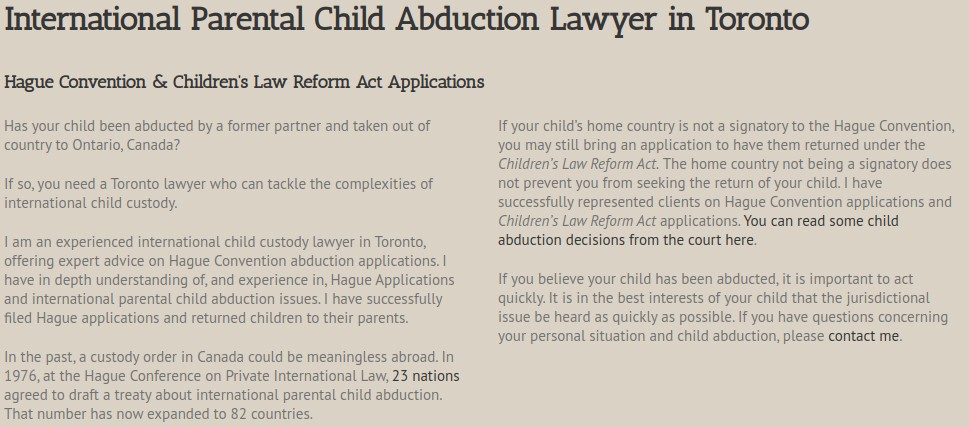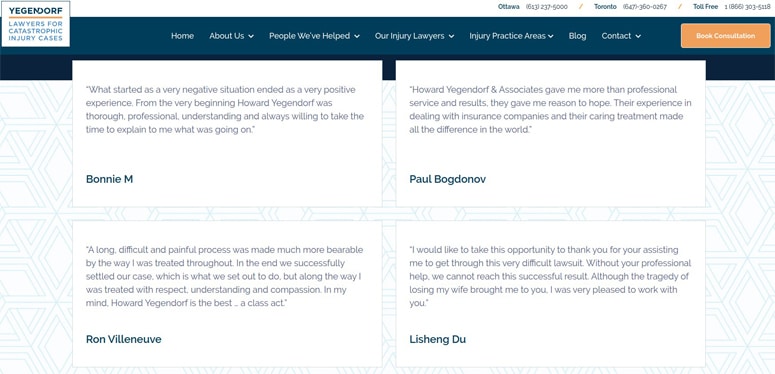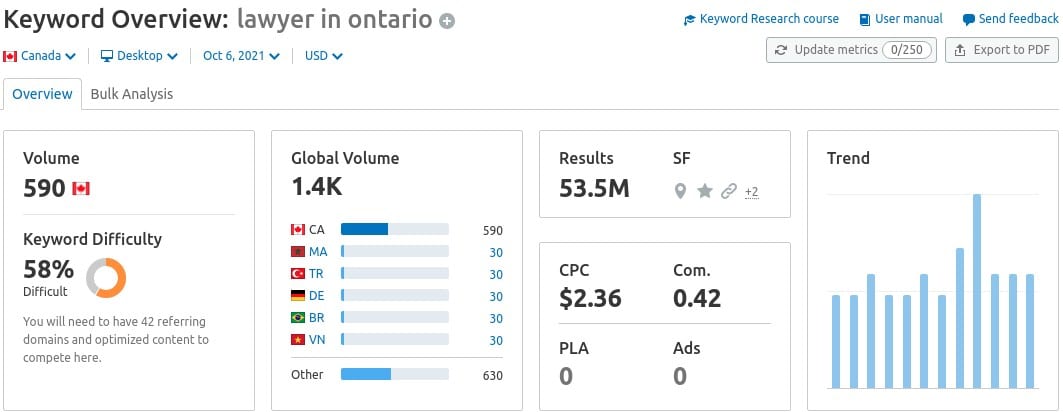Advertising Rules for Lawyers in Ontario: Do’s and Don’ts
You’re an ambitious lawyer with big plans for your practice in Ontario.
You’re ready to implement cutting-edge marketing tactics that showcase your expertise, impress new clients, and dominate the competition.
There’s just one thing holding you back – legal advertising rules.
What’s allowed? What’s not allowed? Where is the line? Are you playing it too safe? Is there room to challenge the rules?
You need to refresh yourself on Ontario’s advertising rules for lawyers.
Firstly, you’d better not call Saul:
Saul Goodman’s advertising advice would be this – be disruptive, deceptive, and downright distasteful. This would lead to disaster for any reputable law firm.
If you want your law firm’s advertising to get results without breaking the rules, we’re here to help.
We’ll be diving deep into defining Ontario’s advertising rules for lawyers and explaining how you can follow them.
We’ll also provide you with actionable advice on the marketing strategies that will get results for your law firm.
[table_of_contents]
First, Some Background on Law Firm Advertising Rules
Before we cut to the chase and explain the advertising rules for lawyers in Ontario, we’re going to take a look at how and why they exist.
This is because explaining the context behind this topic is part of the SEO strategy behind our blog – but, context matters a great deal to lawyers, too.
So, if you’d like to understand the historical background of legal advertising rules and the impact of digital marketing, keep reading.
If you’d rather get straight to the point, we get it. Skip ahead.
A Brief History of Advertising Rules for Lawyers
Back in the good old days, law firms never needed to advertise.
Every little town or district had a local legal practice, with the partners’ names in gilded letters above the window.
In many countries (including Canada), advertising a law firm was illegal.
And in Germany, up until 1990, you’d face serious objections for listing your practice in the yellow pages!
In the US and Canada, a landmark decision by the Supreme Court in 1977 (Bates v. State Bar of Arizona) finally granted attorneys the right to market their services.
But the ethics of law firm advertising have continued to be challenged and debated by court systems.
The most important decision was made in New York in 2007 – an attorney’s Ten Commandments of what NOT to include in an ad:
- Client endorsements
- Portrayal of judges
- Paid testimonials
- Portrayal of a fictitious lawyer or law firm
- Using actors
- Promoting irrelevant characteristics of the lawyers
- Ads resembling legal documents
- Soliciting new clients within 30 days following a tort
- Limits on how you communicate with non-clients
- Using a nickname or moniker
Interestingly, rules 1, 2, 4, 6, and 10 were later amended and struck down for being unconstitutional.
So, Can Lawyers Advertise in Ontario?
Yes, absolutely.
Just follow three core rules from the Law Society of Ontario’s Code of Conduct.
| Rule | Summary |
| 3.02(2) | Marketing messages must be accurate, not misleading, and in the best interests of the public. |
| 3.03 | You can’t say you’re a specialist in an area of law unless you’ve been certified by the Law Society of Ontario. |
| 3.02(3) | Lawyers can advertise their fees if they are accurate, disclose tax additions or inclusions, and are honoured by the lawyer. |
Those are the rules, straight from the Ontario government.
Now, go and follow them.
Only joking, let’s dive deeper.
What Happens if Lawyers Break Advertising Rules?
Well, it’s hard to say.
It’s fairly easy to find law firm websites that seem to be taking liberties with the rules. However, there aren’t many available resources on recent cases of lawyers facing consequences for breaking advertising rules.
What we do know is that the penalties for breaking the Competition Act, Canada’s primary legislation for advertising and marketing, are:
- Going to court with the Competition Tribunal
- Publicly saying you’ve done a naughty thing and you’re very sorry
- Paying restitution
- Penalties of up to $750,000 for individuals and $10 million for corporations
That doesn’t sound particularly comfortable, does it?
Okay, onto how to be safe with your advertising. Here’s what NOT to do…
LSO Advertising Rules – What You Can’t Do
Claim to be a ‘Specialist’ or ‘Expert’ Without Certification
If someone’s ex-wife takes custody of their child unlawfully and takes them across their state border, they’re going to be desperate for legal help.
And if they see your ad on Facebook claiming to be an expert in child abduction, they’ll be calling your number in a matter of seconds.
They’re in a desperate state and they take your ad seriously.
But if your level of expertise hasn’t been verified by a third party…
- You’re at risk of appearing to mislead clients, and
- They’re at risk of hiring an inexperienced lawyer
Now, that dramatic story makes the rule sound super simple – don’t say you specialize unless you’ve been approved by the Certified Specialist program.
But, of course, it’s more complicated than that, with many legal experts thinking a specialized lawyer does not need to be certified.
You can get tangled up in all that, or you can just follow the rules and get certified. We recommend the latter.
Apply for certification here.
Another thing you can do is avoid the words “specialist” and “expert” altogether, while still insinuating your proficiency in this area of law.
Here’s a clever example:
Appeal to Emotions in Your Advertising
In most industries, the success of an ad campaign hinges on its ability to evoke an emotional response – particularly feelings of fear, anger, happiness, belonging, and greed.
And we’re all used to it as consumers, especially at Christmas.
Ads that play on consumers’ emotions see a 31% success rate, which is almost double the success rate of rational marketing messages.
But the Law Society of Ontario restricts lawyers from advertising with “testimonials or endorsements which contain emotional appeals.”
Even if your recent case decision had life-changingly positive results for a client, you can’t include this story in your advertising.
Avoid:
- Descriptions of your clients’ suffering or hardship prior to seeking your services
- Glowing demonstrations of your clients’ improved life and wellbeing following your success
- Agitating your audiences’ pain points (eg. anger at an unfaithful spouse, helplessness following a workplace accident)
- Emotional music, stock images, and videos
These advertising rules for lawyers in Ontario exist to prevent clients from being misled. The goal is to prevent the illogical expectation that they’ll experience the same positive results as the client in the testimonial.
Does this mean you should throw all humanity out the window and stick to the Mr. Spock persona?
Absolutely not.
There’s still plenty of room for personality and even humour in legal advertising – it all depends on your brand identity and what works for your target audience.
Choosing the right marketing agency will help you strike the perfect balance between rationality and charisma.
Demonstrate aggression or clear competition with other firms
The Law Society of Upper Canada restricts ads that suggest or imply that the law firm is aggressive.
Like this:
Including characteristics like ‘aggressive’ in your law firm marketing aligns with the Harvey Specter stereotype, but does nothing to demonstrate your skill or expertise.
This advertising law goes against the digital marketing trends in other industries, where aggressive outbound tactics are popular and verge on playing dirty.
A popular example is when brands pay for ads using a competitor’s business name as a keyword.
Just try Google searching…
- Asana – you’ll see ads for Monday.com
- Moz – you’ll see ads for Semrush
- Pizza Hut – you’ll see ads for Domino’s
These strategies are effective in that they shove a competing business in front of potentially interested customers.
But, do aggressive advertising strategies actually work?
No. 85% of consumers say that obnoxious ads give them a poor opinion of the business using them.
LSO Advertising Rules: What You Can Do
Demonstrate Experience in Specific Legal Practice Areas
Obviously, potential clients need to know if their needs fall under your experience.
You can, and should, list the areas of law that you focus on.
If you’re not certified, you can simply list your experience without using the words “specialist” or “expert”.
Like this:
Even better, you should provide educational resources about the areas of law that you practice.
Not only does this demonstrate your expertise – you’re essentially walking the talk – but it also builds trust with your audience instead of turning them off.
We’ll talk more about this when we cover content marketing, skip ahead here.
Use Testimonials (as Long as They’re Unemotional)
Law firms can absolutely use testimonials – just hold the gushing endorsements, emotional stock footage, and melodramatic music.
Here’s an example of a law firm using testimonials perfectly:
(Source)
These testimonials are candid and human but also stick to the point.
There are countless statistics out there to demonstrate how crucial social proof is to a business’s success.
We’ve chosen three from this pile:
- 92% of customers read online reviews before buying
- 88% of people trust online testimonials as much as a recommendation from a friend or family member
- Using testimonials can generate 62% more revenue
As long as you stick to the rules, testimonials are an essential part of a lawyer’s marketing strategy.
Advertise Your Fees (as Long as They’re Clear and Correct)
When 96% of people don’t trust ads, transparency will set you apart from the rest.
Legal fees are also expensive, and people deserve to know what they’ll be paying – especially if most of your clientele are on a budget.
So, how do you talk about fee arrangements, retainers, and referral fees while maintaining a high standard of professionalism?
You can use a disclaimer, like this law firm:
Sometimes, it’s not helpful to list your fees – after all, legal fees vary dramatically between clients.
You can still demonstrate transparency and build trust by offering a free, no-obligation video consultation.
(Source)
6 Strategies For Law Firm Marketing in Ontario Canada (+ Examples)
1. Prioritize Inbound Marketing
Before we dive into specific methods, let’s call out the one overarching strategy that helps law firms build trust and attract clients while playing by the rules.
What is inbound marketing? The best way to explain is to compare it to outbound marketing.
| Marketing type | Characteristics | Examples | Advantages | Disadvantages |
| Inbound |
Value-driven An investment Permissive Non-aggressive |
Blogs Webinars Landing pages Videos Podcasts |
Builds trust with your audience Easily scalable and better ROI over time Earns domain authority and higher SERP positions Demonstrates your authority and expertise |
Large upfront investment required Takes time to see results It’s hard to find good content writers |
| Outbound |
Exposure-driven An ongoing cost Disruptive Aggressive |
PPC advertising Direct emails Pop-ups Radio ads Cold calling |
See immediate results Easy to measure Cheaper upfront cost |
It can look unprofessional Expensive to scale People don’t trust ads |
Don’t pour your marketing budget into mass advertising and short-lived lawyer’s advertisements that rely on disruption.
Instead, law firms should invest in high-value content that educates their audience on legal topics.
Why? Because 96% of people turn to Google first when looking for an attorney.
What gets you to the top of the SERPs? Producing a goldmine of long-form content that is valuable, relevant, and unique – at scale.
Not only does this tactic generate three times more leads per dollar than outbound, but inbound legal marketing strategies align perfectly with advertising rules for lawyers in Ontario.
This is because blogs, guides, podcasts, and videos offer your audience relevant information without misleading their purchasing behaviour – quality trumps clickbait.
2. Create Specific Landing Pages For Practice Areas
A landing page is a standalone web page built around driving one specific action – converting visitors into leads.
Having a specific landing page for each of your practice areas achieves a number of goals:
- Showcase your experience in that area of legal practice
- Target specific practice and location-based keywords
- Educate visitors about the area of practice
- Build trust with authentic testimonials
- Collect leads via a user-friendly form
- Establish brand recognition with impressive lawyer website design
- Acts as a destination for future outbound strategies (LinkedIn ads, Google ads)
We created specific landing pages for each of Grillo Law’s practice areas.
Here’s an example:
Landing pages are an essential part of your law firm’s marketing strategy, but getting them right can be challenging.
To attract leads and dominate the SERPs, you need to strike the perfect balance between design, content, and SEO.
3. Produce and Distribute Long-form Blog Content
If your goal is to build your domain authority, blog posts should be the cornerstone of your digital marketing strategy.
After all, almost half of consumers now read 3-5 pieces of content before reaching out to a sales team.
Blogs (and similar communications like guides and case studies) are essential for law firms to…
- Establish domain authority and rise up the search rankings
- Build trust with their audience
- Advertise legal services
- Demonstrate thought-leadership and education
- Earn backlinks from other reputable sources
But they’re difficult to get right.
The most relevant reason for this is that lawyers don’t have the time or the expertise to think of topics, write about them engagingly, and produce enough content per month to see results.
This law firm offers topical resources with tangible, actionable advice. However, it falls down in the visuals department, with no images or structural elements to help readers process and retain information.
So, how can your law firm get it right?
Reach out to a digital marketing agency that specializes in content marketing for law firms.
The best marketing agencies will:
- Build you a content strategy that focuses on relevance, value, and ranking opportunities
- Create briefs for educational and entertaining content
- Outsource to skilled writers who can bridge the gap between your expertise and your audience’s interests with an engaging tone of voice
To be honest, that was a shameless plug for us.
4. Invest in Video Marketing
The explosion of video marketing in the last two years has been astounding.
We can speculate about whether it’s due to the pandemic or addictive algorithms, but it’s clear that people are spending an insane amount of time watching video content.
The very latest stats show that:
- Video content will make up more than 82% of traffic by 2022
- Consumers want to see more video content from companies and brands
- People retain 95% of a marketing message via video than through other sources
This shows that jumping on the video bandwagon won’t just appease your audience and get you more traffic, people will actually remember your marketing messages.
So, what sort of videos should your law firm produce?
You don’t have to pursue virality and controversy, as this divorce attorney did…
Instead, focus on video content that offers the most education and value to your audience. That will earn you consistently high engagement over time.
Here are some ideas:
- Interviews with your legal team
- Testimonials from clients (as long as they’re rational and non-emotive)
- Walk-through of your processes
- Advice for different areas of law (depending on your expertise)
Video marketing is an opportunity to showcase your law firm’s brand identity, giving clients a personal insight into the kind of experience they’ll have with your team.
They can be a huge investment, but they also don’t have to be a major motion picture.
A simple summary of key points discussed in a blog or guide will add a personal touch to your content without the need to go overboard with filming.
5. List Your Legal Practice in Directories
A core part of your law firm’s ability to rank on Google is how many reputable sites are linking to it.
The most effective way to start linkbuilding for your law firm’s website is to get listed on directories.
Getting listed on a directory is not only beneficial to your domain authority, but also to the 96% of people who turn to Google when seeking an attorney.
If they can find you quickly and easily, you’re already off to a great start providing a valuable service.
Let’s take a look at the value of directory sites for lawyers in Ontario.
When searching for “lawyers in Ontario” the top organic results on page 1 are ALL directories:
We’ve turned this into a helpful table to show you the amount of traffic going to these sites.
This is what the scores mean:
- Domain authority score – this depicts the likelihood of this website ranking for relevant keywords. The higher the directory’s domain authority, the more reputable your law firm will seem if it’s listed there.
- Referring domains – the number of websites with links to the directory, demonstrating its reputation
- Total backlinks – the number of individual pages linking to the directory, demonstrating the many opportunities for traffic to be diverted to the site
- Monthly visits – the total number of unique visits by users to the directory in the last few months
- Total keywords – the number of keywords bringing users to the directory via Google’s top 100 organic search results.
| Attorney Directory | Domain Authority Score | Referring Domains | Total Backlinks | Monthly Visits | Total Keywords |
| Law Society of Ontario | 59 | 202 | 2,000 | 474,000 | 136,000 |
| Best Lawyers | 13 | 20 | 153 | 241,000 | 121,000 |
| HG.org | 0 | 5 | 17 | 1,200,000 | 546,000 |
| Martindale.com | 17 | 9 | 61 | 566,000 | 542,000 |
| Canada Law List | 43 | 1,300 | 29,400 | 104,000 | 45,800 |
(This table was made using data from Semrush.com, correct as of 28/09/2021)
Now you understand the importance of getting listed in an online legal directory – but, how do you get there?
You’ll need to directly contact the directories you want to be listed on. Some will be free, others will require an ongoing fee to be listed.
But, before you get listed, make sure your online presence is looking sharp.
Here’s a checklist:
- Update your GMB listing
- Make sure your website is completely up-to-date
- Ensure your website is mobile responsive
- Freshen up your testimonials to include your most recent clients
You don’t want your hard-earned traffic to bounce as soon as they see your outdated website!
6. Run a Google AdWords Campaigns
Run a Google search for lawyers in your area and you’ll see that ads take up almost the entire top section of the SERPs.
If you play your cards right, a highly optimized Google AdWords campaign (alongside continued inbound marketing efforts) will help you attract leads.
Too many law firms make the following mistakes with their paid advertising strategies:
- Targeting huge, expensive keywords with far too much competition – eg. “lawyer in Ontario”
- Neglecting research into their audience’s search intent and which service gets the most traffic
- Failing test and adjust the campaign regularly
The key to success with paid advertising for lawyers is choosing long-tail keywords.
For example, take a look at the keyword “lawyer in Ontario”.
It has a reasonable volume score, but also a fairly high rate of difficulty and average cost per click. Semrush even tells you that you’ll need 42 referring domains to have the slightest chance of ranking.
If you throw your marketing budget at this keyword, it’s money down the drain.
Instead, opt for long-tail keywords. These keywords are far less difficult and have less traffic – but there’s less competition.
For example, ”workplace injury lawyer london ontario”:
Long-tail keywords represent more specific search intent. When people know exactly what they’re searching for, they’re far more likely to take action when they see your ad.
Paid advertising strategies for law firms are tricky, and it takes a lot of experience and experimentation to see results.
Seek guidance from a specialized marketing agency and ask them for case studies showing the results they’ve achieved for law firms with paid advertising.
Advertising Rules for Lawyers in Canadian Provinces
Legal marketing rules are almost exactly the same across the Canadian provinces, so these sections will be repetitive.
However, if you’re looking for specific resources for legal advertising rules in your province, you’ll find this helpful.
Advertising Rules for Lawyers in British Columbia
The rules around the marketing of legal services in British Columbia can be found on the Law Society website.
In a nutshell, the rules are:
- Advertising should not be false, inaccurate, unable to be verified, misleading, or against the best interests of the public
- Legal advertising breaks this rule if it is taking advantage of vulnerable situations, fuels unrealistic expectations of results, or questions the justice system
Advertising Rules for Lawyers in Alberta
Alberta’s legal marketing rules are almost identical to the rules we’ve already discussed.
We took note of a few additional things you can’t do when advertising your law firm in Alberta:
- Say that you or your law firm is superior to others
- Use law firm names, trade names, logos, or letterhead that obscure the fact that you practice law
- Insinuate in marketing materials or business cards that you have ‘Partners’ or “Associates’ when you practice alone
Advertising Rules for Lawyers in Nova Scotia
Nova Scotia’s Barrister Society lists the rules surrounding the marketing of legal services.
The rules are identical to what we’ve already covered in this blog, except for a few pieces of commentary:
- Lawyer’s advertising may be designed in such a way that assists potential clients with choosing an appropriate lawyer
- Law firms that practise in other jurisdictions may advertise their specialization even if it’s only recognized by jurisdictions outside Nova Scotia
- Lawyers may advertise preferred areas of law and restrictions around areas of law they won’t practice – as long as this is not misleading
Conclusion: Attract New Clients With A Magnetic Legal Marketing Strategy
We’ve covered a lot in this blog.
You should have a solid understanding of…
- What the advertising rules for lawyers in Ontario are
- What they actually mean for your digital marketing
- How you can start implementing effective advertising strategies
The only question is – where do you start?
Lawyers don’t have time to plan, build, and implement an effective marketing strategy.
That’s where we come in.
dNOVO is a specialized marketing agency that takes care of advertising for ambitious law firms. We’re on the pulse of developments in SEO and we strive relentlessly to get results for our clients.
Ready to take your law firm to the next level? Let’s talk.













